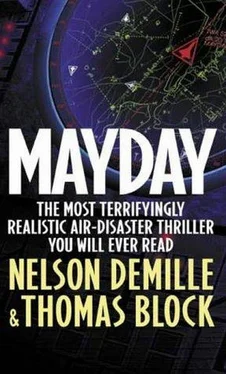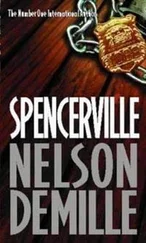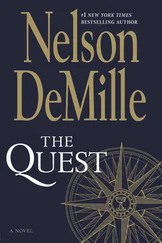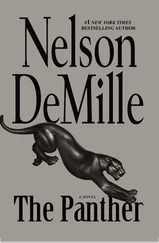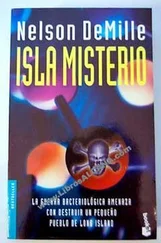Nelson DeMille - Mayday
Здесь есть возможность читать онлайн «Nelson DeMille - Mayday» весь текст электронной книги совершенно бесплатно (целиком полную версию без сокращений). В некоторых случаях можно слушать аудио, скачать через торрент в формате fb2 и присутствует краткое содержание. Жанр: Триллер, на английском языке. Описание произведения, (предисловие) а так же отзывы посетителей доступны на портале библиотеки ЛибКат.
- Название:Mayday
- Автор:
- Жанр:
- Год:неизвестен
- ISBN:нет данных
- Рейтинг книги:4 / 5. Голосов: 1
-
Избранное:Добавить в избранное
- Отзывы:
-
Ваша оценка:
- 80
- 1
- 2
- 3
- 4
- 5
Mayday: краткое содержание, описание и аннотация
Предлагаем к чтению аннотацию, описание, краткое содержание или предисловие (зависит от того, что написал сам автор книги «Mayday»). Если вы не нашли необходимую информацию о книге — напишите в комментариях, мы постараемся отыскать её.
Mayday — читать онлайн бесплатно полную книгу (весь текст) целиком
Ниже представлен текст книги, разбитый по страницам. Система сохранения места последней прочитанной страницы, позволяет с удобством читать онлайн бесплатно книгу «Mayday», без необходимости каждый раз заново искать на чём Вы остановились. Поставьте закладку, и сможете в любой момент перейти на страницу, на которой закончили чтение.
Интервал:
Закладка:
Captain Stuart heard the door go. Suddenly, every loose object on the flight deck-maps, pencils, coffee cups, hats, and jackets-lifted into the air and converged on the open door, then disappeared into the lounge and down the stairway. Stuart felt himself pulled back into his seat. His arms flew up over his head and his wristwatch ripped loose. He pulled his arms down into his lap and waited until the initial rush of air subsided. He sat still trying to steady the hard beating in his chest. He calmed his rushing thoughts and tried to reconstruct what had happened in the last few seconds. He remembered that he had felt the jolt of a mild impact on the Straton only seconds before, but he had no idea what had caused it. What he did know was that the autopilot was still functioning and the craft was still under control. He glanced quickly at McVary, then glanced quickly back at Fessler. “What happened?” he yelled.
McVary kept staring silently at his instruments.
Fessler was looking back at the open door and didn’t respond.
“Descend!” Stuart commanded, and yanked shut the power levers controlling all four engines, then disengaged the autopilot and pushed forward on the control wheel. The Straton transport abruptly nosed downward. But at their incredibly high cruise speed, the forward momentum slowed their initial descent. Stuart watched the ground altimeter as they moved slowly downward. Fifty-eight thousand feet. Fifty seconds had gone by since the impact.
Stuart quickly scanned his instruments. Cockpit indications were still good, except that he had already lost a major portion of his pressurized cabin air. His first thought was that a fuselage door had somehow opened. He looked at the door warning lights. They showed all the doors closed. Had a faulty window blown out? No. The decompression was much too rapid for that, and what had caused the jolt? A bomb. It had to be a bomb, he thought. What is happening back there?
Stuart looked at the cabin altimeter-the differential pressure gauge-which told him at what relative altitude the cabin pressure was. The hands of the cabin altimeter were spinning upward like those of a broken clock. The cabin pressure, which had always been kept at 10,000 feet, was now at 19,000 feet. Losing pressure. Hold the pressure. They were losing the artificial atmosphere that they had brought with them-this atmosphere from earth that made it possible to live at 62,000 feet-throwing it out into subspace, through some large hole.
Stuart glanced at the two altimeters together. The ground altimeter showed that the Straton had only gotten down to 55,000 feet. The cabin altimeter showed that they now had an artificial altitude pressure of 30,000 feet, then 35,000 feet. Stuart estimated that the artificial atmosphere would bleed off at about the time the Straton hit 50,000 feet. Then the altimeters would read the same. Subspace would be in the cabin.
Stuart started to feel light-headed. Instinctively, he pushed the autopilot button back on. He slammed his hand into the automatic descent selector, pushing it to its maximum rate of descent, letting the computer bring it down as fast as it was safely possible. He sat back in his seat. His head was pounding with pain. Sinus cavities. The air pockets inside his skull could not adjust to the rapid rate of cabin altitude change. His nose began to bleed. A river of blood poured down his white shirt. His lungs had already been emptied of most of their air. He felt hollowed out. His hands and feet were cold, and he didn’t know if it was from loss of blood or loss of cabin heat.
The Straton’s four engines were sucking up and compressing the thin outside air and pumping all the pressurized air they could into the ruptured cabin. As they descended lower, the air was slightly thicker and the pressurized airflow became stronger. But Alan Stuart suspected, knew really, that it was a losing battle. There was one hell of a big hole back there, and the arithmetic of the problem… If a basin has ten gallons of water and is losing one gallon a second through the drain, and a tap is replacing a half gallon every five seconds, how long before… Too long. His head was bursting, and he couldn’t think of anything but the pain now.
Captain Stuart turned his head slowly toward McVary. McVary had strapped on the copilot’s oxygen mask and was transmitting an emergency radio message on the international distress frequency. Stuart shook his head. “Useless,” he said softly, but he also reached for his oxygen mask and pulled it on, tightening the straps hard against his face. He looked back at Fessler. Fessler was lying slumped across his desk. Blood was pouring from his mouth, ears, and nose.
McVary continued to transmit the distress signal, though his speech and thoughts were fragmented. He sucked hard on the oxygen mask as he spoke, and blood collected in his mouth and he had to swallow it.
McVary knew that the oxygen mask alone was not enough. Without a sustaining pressure to force the oxygen into and through his lungs, it was almost totally useless. The flight deck’s emergency oxygen canister, behind Fessler’s panel, could just as well be back in San Francisco for all the good it was doing them. Only a military pressure suit-a space suit-of the type he had once worn could exert the necessary pressure on his body so that he could breathe. But he knew that even if he had one, there would not have been enough time to hook it up.
Dan McVary, who as a young man had flown exotic military jets through wild maneuvers, was suddenly more frightened than he had ever been. How had this happened? Commercial transports were not supposed to completely decompress the way military craft did when they were hit in combat. The possibility of sudden decompression was so slight that it had been ignored by the aeronautical engineers who built the Straton. There were no air-lock doors or pressure bulkheads between the sections as there were watertight compartments on a ship or airtight compartments on modern dirigibles. These safety features were too heavy for an airliner. Too costly. A complete decompression was not supposed to happen. But it had. How? He wondered if airtight compartments would have helped anyway. The image of the Titanic with its so-called watertight compartments flashed through his mind. Engineering marvels… every contingency planned for… only a set of the most… the most unusual circumstances… his head was splitting and he felt a coldness deep down in his body that chilled him in a way he had never felt before. Dan McVary knew he was dying.
Captain Stuart’s vision began to blur. He pushed his face forward to read the digital clock. Over a minute had passed since he felt the jolt. The Straton was still on autopilot and was beginning to descend very rapidly. He could see that the vertical descent rate had increased to 12,000 feet per minute. They passed through 53,000 feet. The cabin pressure was up to 45,000 feet. They were definitely not going to get down to a level where the oxygen masks could be used in time to save anyone who was still able to use them. They would not get into the naturally breathable atmosphere for several minutes after that. He shook his head. They were all dead.
For an instant, Stuart considered the passengers. They were his responsibility. But there was nothing he could do, or even say. There were no slow sinkings on an aircraft, no dramatic speeches from the captain, no leisurely good-byes or farewell toasts. There were only a few minutes or seconds of horror, then death.
In the tourist cabin, the noise from the wind and escaping air had lessened considerably as the inside and outside pressure approached equilibrium. People could hear each other now, but there was very little talking. Most people sucked hard on their released overhead oxygen masks, inhaling and exhaling deeply, puzzled by the absence of that familiar feeling of having taken a good deep breath.
Читать дальшеИнтервал:
Закладка:
Похожие книги на «Mayday»
Представляем Вашему вниманию похожие книги на «Mayday» списком для выбора. Мы отобрали схожую по названию и смыслу литературу в надежде предоставить читателям больше вариантов отыскать новые, интересные, ещё непрочитанные произведения.
Обсуждение, отзывы о книге «Mayday» и просто собственные мнения читателей. Оставьте ваши комментарии, напишите, что Вы думаете о произведении, его смысле или главных героях. Укажите что конкретно понравилось, а что нет, и почему Вы так считаете.
